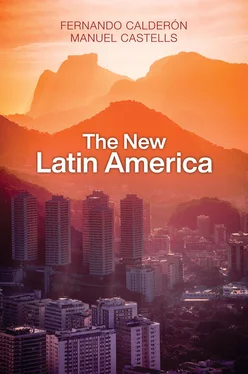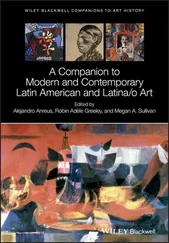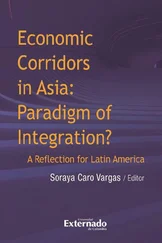1 ...6 7 8 10 11 12 ...15 Another sui generis case is the Peruvian one. Here the neoliberal model was consistent and lasting, and it has prevailed economically throughout the first decades of the twenty-first century. It was based on an economic policy initiated by Fujimori, which coexisted with various other political projects, like the neo-developmentalist project of Alan García or the indigenist projects of Ollanta Humala. Here, as in Chile, poverty was reduced, in the Peruvian case from 55 percent in 2001 to 31 percent in 2010. But chronic social inequality persisted (Araníbar et al., 2013: 293). Real salaries rose from $101 (in US dollars) in 2001 to $110 in 2010, that is, at a rate much lower than the Latin American average, which went from $101 to $158 in the same period (Araníbar et al., 2013: 302). Moreover, the Peruvian context remains characterized by social conflict, especially in the south of the county. Interestingly, according to public opinion polls, citizens express widespread dissatisfaction with the functioning of the economy as well as with the state of Peruvian democracy (Araníbar et al., 2013).
Social Resistance and Political Change as Sources of Neo-Developmentalism
Revolts against social exclusion and demands for multiculturalism and dignity are at the root of the political processes that took place in Venezuela, led by Chávez, in Ecuador led by Rafael Correa, and in Bolivia led by Evo Morales. Moreover, the four consecutive electoral victories won by the Partido dos Trabalhadores (PT, or Workers’ Party) in Brazil, under the charismatic leadership of Luiz Inácio Lula da Silva changed the balance of political power in the region. Building on the stability of the macroeconomic and modernizing policies of Fernando Henrique Cardoso (despite profound differences between Lula and Cardoso), the PT was in the vanguard of the process as it sought to further stabilize a new developmentalist state. The Brazilian emphasis on investment in productive infrastructure, together with an increase in public spending and a set of redistributive policies, was at the origin of neo-developmentalism in Latin America.
Argentina underwent a similar process under Kirchnerism, combining socio-political mobilization from the Peronist movement with a state that played a dominant role, which came to prevail over multinational corporations and to exercise control over financial markets as well as over Argentina’s economy more generally. Uruguay joined this effort under the leadership of President Mujica, a former Tupamaro militant who fully embraced democracy, affirming dignity and welfare and becoming one of the most respected political figures on the international stage.
Thus, Latin America laid the political foundations for a strategy of development organized by the state, based on the extraction of natural resources for export and the creation of productive infrastructures that would generate funds for the sort of public social spending that could improve living conditions for the population. Statism, productivism, and social welfare were expanded in a process of combined interaction that lent support to neo-populist movements and parties on the left and gave rise to a twenty-first century version of left politics. The success of this strategy, however, depended in large part on charismatic leaders and on the favorable new conditions of the world economy. In this way, a system of corporate patronage and domination was established that would later undergo a general crisis.
Charismatic Leaders, State, and Society
The idea of a return to the people, defined as the subject of history and identified with the nation and the state, was fundamental for the construction of the neo-developmentalist strategies that arose in new global and regional contexts. The state and the charismatic leader combine in the popular imagination, becoming fundamental referents for policies that seek both social integration and development, as well as for confrontations with traditional powers and national conservative elites. At the same time, there was widespread and realistic political resistance to negotiations and agreements with transnational corporations and neoliberal states, especially developed countries and China.
As Cardoso and Enzo Faletto argued, considering the role of leaders in politics: “We know that the course of history depends largely on the daring of those who propose to act in terms of historically viable goals” (Cardoso and Faletto, 1979: 176; translation slightly modified). Even more than other leaders, charismatic neo-developmentalist leaders vary according to the particular psycho-social and cultural characteristics of various Latin American societies. Their “daring” is born from their own political mystique, but it is not unrelated to the possibilities and problems in these countries.
Around 2000, a historical turning point began, one that marked a shift in both democracy and development. This was a moment in which the political stage was reconstituted, neoliberal projects broke down, and neo-developmentalist projects with populist characteristics became widespread throughout the region. This led to the taking of power by more than fifteen neo-developmentalist governments in Latin America and the Caribbean. Each of these governments had different traits and confronted different national problems and challenges that varied in intensity.
At the center of these changes, charismatic leaders stood out, even in their absence. These leaders oversaw the processes of change, and their behavior decisively informed the crises that these countries experienced and are experiencing. As we have mentioned, the Chilean case was exceptional in that it combined the application of a relatively heterodox model of neoliberalism with political reforms overseen by the Concertación. Nevertheless, the parties involved in the Concertación dealt with clientelist practices every day.
Neoliberalism was associated with meager economic outcomes, with increases in social inequality, and especially with rising levels of poverty. Thus the result of neoliberal policies was a severe crisis of legitimacy for neoliberal institutions and political projects. Neo-developmentalist projects were more porous and variable than neoliberal ones. Notably, these projects resulted from looking back and reflecting on past national popular movements, especially those led by the first generation of populist social and political leaders after the Mexican Revolution. The ghosts of Emiliano Zapata, Juan Lechín, Juan Perón, Getúlio Vargas, Fidel Castro, and even indigenous leaders like Túpac Katari, among others, presided over the construction of charismatic neo-developmentalist forms of leadership.
It is worth mentioning some key points of reference in this context. On the one hand, a critical social vision emerged, one that was dissenting but widespread and that expressed dissatisfaction with increases in social inequality. For example, in 2010 only 21 percent of Latin Americans considered the distribution of wealth in the region fair (Latinobarómetro, 2010: 19). On the other hand, we can easily recognize these movements as continuous with a long history of popular demands that the state play a leading role in the economy and in society, that it promote both social integration and the creation of jobs and social benefits, including the expansion of access to the systems of consumption that characterize societies centered on information and communication.
The rates of support for statism by country, calculated by the Latin American Public Opinion Project (see figure 1.2), reflect average levels of citizens’ support for a state that plays a leading role in four economic areas: ownership of the most important industries, social welfare protections, job creation, and the reduction of inequality. The conclusion is clear: the demand that the state play a fundamental role in the economy and society was prevalent. Similarly, in a study of social protest in 17 Latin American countries, the state was found to be the main target in the majority of social conflicts in the region between 2009 and 2010 (Calderón, 2012). These data show the importance of the state for Latin Americans.
Читать дальше












